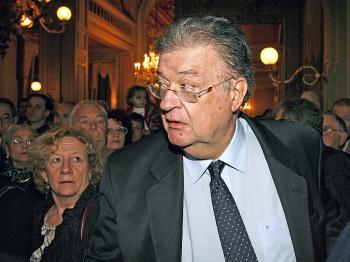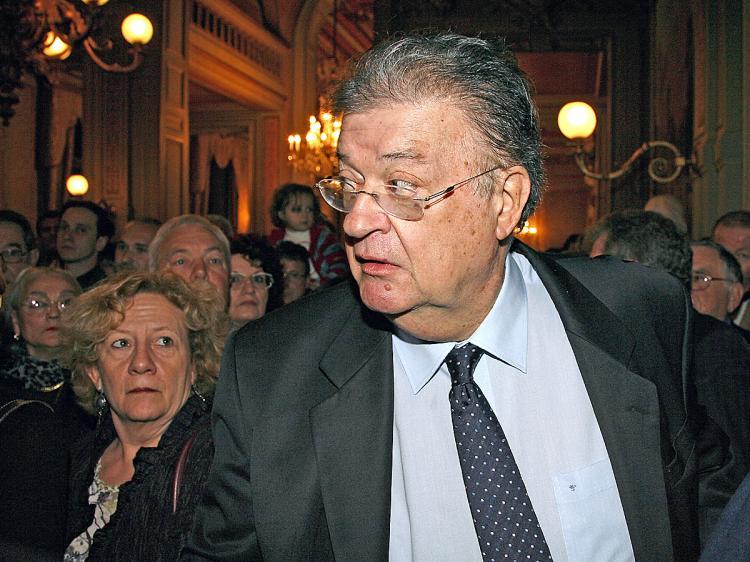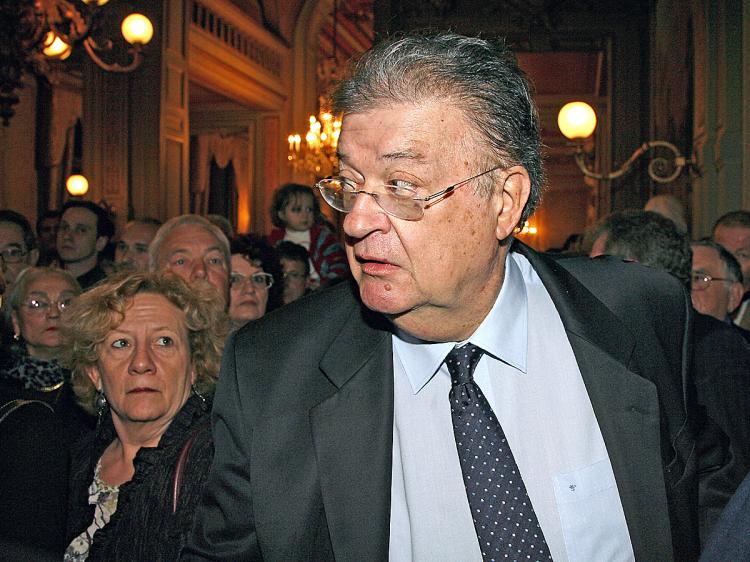PARIS—In a dramatic flourish before this country’s regional elections in mid-March, outspoken political figure Georges Frêche has announced his intention to sue the Socialist Party for what he calls a “political vendetta” against him. The move is emblematic of the ongoing public tension between Frêche and his political opponents.
President of the southern coastal Languedoc-Roussillon region, Frêche was expelled from the Socialist Party in early 2007 after he made one too many controversial or racial utterances. One of the latest, before the expulsion, was in February of the previous year, when he called a group of Muslim Algerians “less than human.”
Recently, Frêche said he would never vote for Socialist leader and former Prime Minister Laurent Fabius because “the guy does not look very catholic to me.” When L'Express newspaper published the statement on Jan. 28 of this year, the Socialist Party claimed the comment was anti-Semitic and targeted at Fabius’s Jewish origin.
In a long-awaited move, the Socialist Party’s leadership recently announced that it would have a candidate against Frêche in Languedoc-Roussillon for the March regional elections. Before then, the socialists had not put candidates against him for fear that splitting the left-wing vote would favor the candidate for the right-leaning Union for a Popular Movement.
Frêche, often described as having a brilliant mind but inelegant personality, enjoys strong support in Languedoc-Roussillon, where he has pushed forward economic growth and infrastructure reform during his time in office. Polls credit him with at least 30 percent of the vote.
Undaunted by the move to install a socialist candidate in the region, Frêche responded in typical style: “The only thing I’m afraid of is the sky falling on my head. I have already been excluded from the Socialist Party, they cannot do this twice. … Didn’t you notice that today political parties don’t have any power? But citizens do,” as quoted in Le Parisien.
Local socialist members, largely supportive of Frêche, condemned the Party’s move: “All democratic rules have been respected in our region,” said Didier Codorniou, a local socialist figure. “We will make it to the end with Georges Frêche.”
National Socialist Party leaders have also asked the Green Party to join their regional list to oppose Frêche. Cécile Duflot, National Secretary of the Green Party, responded that their methods were “cynical and dishonest” (before saying that it would accept the offer only if the Green Party would head the Socialist-Green coalition.)
On Jan. 29 a smiling and combative Frêche said to the French press: “There are many knives stabbed in my back, but I am standing straight, and these knifes will fall by themselves.” The next day he published a letter to Fabius saying that the expression he had used was not supposed to carry a religious connotation but was merely a popular turn of phrase used to express distrust in someone.
Frêche also recently announced that Crif, a large pro-Semitic organization in France, was supportive of him. On a dialectic tone, Crif President said to Liberation newspaper: “I know Frêche is not anti-Semitic. … However, a duty of politicians is to think of the consequences of their words.”
Iconic French actor Gerard Depardieu also expressed strong support for Frêche in a press release, saying he is “much more a true and nice person than Martine Aubry and the like! [the Socialist Party National Secretary] Let him do what he has to do; he acted grandly for the Languedoc-Roussillon region and for Montpellier. We should let him continue.”
One-and-a-half months ahead of the regional elections that the socialists hope to win (20 out of 22 French regions are currently controlled by the Socialist Party), it remains unclear whether the fight against Frêche will serve as leverage for the Party. Or will it give the impression that the Party is focused on petty internal matters rather than the major issues? Votes in Languedoc-Roussillon will certainly give a clear answer to that question.
President of the southern coastal Languedoc-Roussillon region, Frêche was expelled from the Socialist Party in early 2007 after he made one too many controversial or racial utterances. One of the latest, before the expulsion, was in February of the previous year, when he called a group of Muslim Algerians “less than human.”
Recently, Frêche said he would never vote for Socialist leader and former Prime Minister Laurent Fabius because “the guy does not look very catholic to me.” When L'Express newspaper published the statement on Jan. 28 of this year, the Socialist Party claimed the comment was anti-Semitic and targeted at Fabius’s Jewish origin.
In a long-awaited move, the Socialist Party’s leadership recently announced that it would have a candidate against Frêche in Languedoc-Roussillon for the March regional elections. Before then, the socialists had not put candidates against him for fear that splitting the left-wing vote would favor the candidate for the right-leaning Union for a Popular Movement.
Frêche, often described as having a brilliant mind but inelegant personality, enjoys strong support in Languedoc-Roussillon, where he has pushed forward economic growth and infrastructure reform during his time in office. Polls credit him with at least 30 percent of the vote.
Undaunted by the move to install a socialist candidate in the region, Frêche responded in typical style: “The only thing I’m afraid of is the sky falling on my head. I have already been excluded from the Socialist Party, they cannot do this twice. … Didn’t you notice that today political parties don’t have any power? But citizens do,” as quoted in Le Parisien.
Local socialist members, largely supportive of Frêche, condemned the Party’s move: “All democratic rules have been respected in our region,” said Didier Codorniou, a local socialist figure. “We will make it to the end with Georges Frêche.”
National Socialist Party leaders have also asked the Green Party to join their regional list to oppose Frêche. Cécile Duflot, National Secretary of the Green Party, responded that their methods were “cynical and dishonest” (before saying that it would accept the offer only if the Green Party would head the Socialist-Green coalition.)
On Jan. 29 a smiling and combative Frêche said to the French press: “There are many knives stabbed in my back, but I am standing straight, and these knifes will fall by themselves.” The next day he published a letter to Fabius saying that the expression he had used was not supposed to carry a religious connotation but was merely a popular turn of phrase used to express distrust in someone.
Frêche also recently announced that Crif, a large pro-Semitic organization in France, was supportive of him. On a dialectic tone, Crif President said to Liberation newspaper: “I know Frêche is not anti-Semitic. … However, a duty of politicians is to think of the consequences of their words.”
Iconic French actor Gerard Depardieu also expressed strong support for Frêche in a press release, saying he is “much more a true and nice person than Martine Aubry and the like! [the Socialist Party National Secretary] Let him do what he has to do; he acted grandly for the Languedoc-Roussillon region and for Montpellier. We should let him continue.”
One-and-a-half months ahead of the regional elections that the socialists hope to win (20 out of 22 French regions are currently controlled by the Socialist Party), it remains unclear whether the fight against Frêche will serve as leverage for the Party. Or will it give the impression that the Party is focused on petty internal matters rather than the major issues? Votes in Languedoc-Roussillon will certainly give a clear answer to that question.







